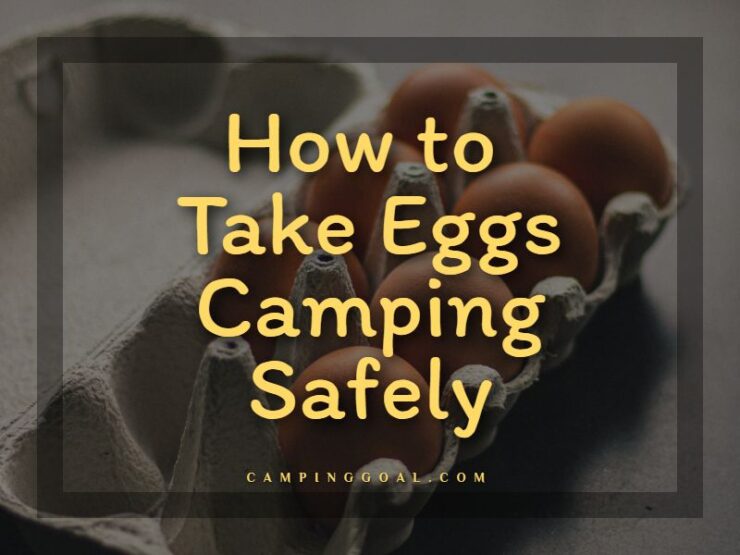Whenever opting to camp outside, easy and fast foods and recipes are the go-to lifesavers. Even those who are not good at cooking can put something on their plate if they have eggs. Since they have a small size, they can be packed easily and take little space they can be carried easily as well.
Eating eggs alone can also be a nutritious snack and they can also be turned into a salad or eaten with dips or sauces. The real problem arises when you have to pack eggs for a longer period of time.
To have optimum fresh eggs is very important because everyone cannot digest the smell of a foul egg. Some people might puke, some might have a fever, or worst case- an infection. Should you just leave eggs and take something else along?
Dehydrated food, instant noodles, coffee, dried fruits, nuts, and sandwiches – everyone has them on their camping trips but how many of them can be considered healthy? Looking over all those options they are sure not to miss for your camp trip. So, what should you do when taking eggs on your trip?
Also don’t miss this post about essential things to bring for your camping adventure.
Be it raw, hard-boiled or soft-boiled, leaving them in their own shells is very important, as well as not forgetting to keep them with cool ice packs or a cooler or even an insulated bag with freezing packs.
As the fresh, newly bought eggs from the market have used before the date of a day or two outside but can last up to four or five weeks in a refrigerator. A fresh farm egg can last a bit more than a month if kept dry with a low temperature in their packs. And a boiled or cooked egg cannot last much longer than 2 hours. Depending on your camping location, you can choose what type of egg you want to carry.
Contents
How To Pack Eggs For Camping Trips?

How to take eggs camping safely and keep them fresh is a question that would pop into your mind first. You can crack and keep them in your zip-lock packs or plastic bags, which can then be frozen before preparing your cooler box. On the off chance that you don’t have a cooler box, it’s a lot more secure to bring dried-up eggs as a safer option. Other options can include :
Boiling The Eggs
If done so, they can easily be peeled whenever needed as a snack with salt or can be used in salads or mixing it with any filling for your sandwich to have a healthy protein food.
Eggs can be boiled easily by adding them to a pan and some water such that the eggs are fully emersed. When the water comes to a boil, five-six minutes onward you can take your eggs out depending on whether you like the yolk funny or hard.
Raw

If you want to eat eggs solely, then bringing them raw is the best option. You can break your eggs in a plastic bottle or zip lock bag to avoid unpleasant breakage and spillage. They can also be frozen beforehand and can then be kept in a cooler box which will prolong their life, and is a good option for long camping trips.
But it has a drawback, without a cooler box bringing raw eggs can be risky because the outside temperature is higher and one cannot be sure when they could go bad.
Carry Frozen Yolks And Whites Of The Egg Separately
Freezing your egg yolks for as long as four months with the help of the right method is conceivable. While cooking, defrosting the frozen yolk prior by basically running them under cool water is all you need to prep your yolks for cooking. You can also substitute one tablespoon of the defrosted yolk for a fresh yolk.
The whites of an egg can be stored significantly better than compared to the yolks when frozen, and last way longer comparatively that is – as long as a year. All things considered, remaining inside a two-month time frame is preferred. For simple use, take an ice tray and put away your egg whites in it, which makes it easy to recall segments and simple to access. These can be brought to room temperature and afterward utilized for a variety of dishes.
Whole Eggs

They can also be frozen as mentioned above a few times but for convenience storing them inside their shells is a big mistake. As liquids expand on cooling the eggshell would break if they are frozen inside their shell.
Various Risks Of Taking Eggs Outside
Salmonella

An infection which you can get if you eat undercooked or not properly cooked chicken or eggs. Even though it is life-threatening, almost all patients make a full recovery. One way or the other however you understand, the side effects are truly horrendous.
Among a few other side effects, you could encounter retching, cramps, runs, fever, migraines, and chills. The chances of getting salmonella increase rapidly in the case of improper storing, you should be especially cautious about your eggs so that they do not get too warm on your next camp outing.
Spoiled Or Bad Eggs
If there is uncertainty about the freshness of your eggs, particularly following a hot day in summer, you ought to give them a test. Just tenderly put your eggs with the shell attached into a bowl or skillet of water.
If some of them sink and lay on their sides, you can cook them, if some of them float, you shouldn’t eat or cook them. If you leave them close to your camping area, you’re simply going to draw wild animals to your area.
Broken Eggs

It’s better to bring extra food than you’d naturally suspect you’ll require, as you will undoubtedly get more hungry after all the strenuous activities, also on the off chance your eggs get spoilt or broken.
Frequently Asked Questions
1. What is the best way to carry eggs?
Dried eggs are the best considering their transportation and shelf life. They can be easily cooked and served among all other options.
2. Can you take Fresh Eggs from the Farm to your camping trip?
If your camping site is not far then they are a better option in comparison to the store-bought ones as long as they haven’t been frozen.

I love to explore the outdoors, cook over a campfire and pitch a tent. I want to share my adventures with you by writing articles, taking pictures, and sharing videos.


